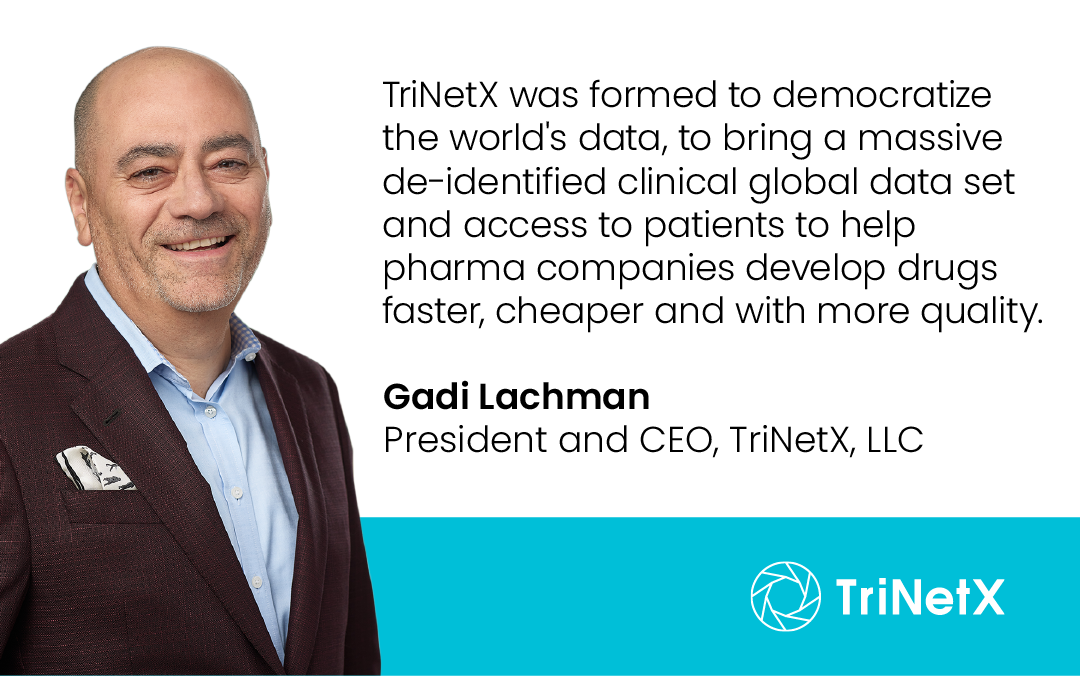Gadi Lachman, President and CEO of TriNetX, discussed the profound impact RWD is having on the healthcare industry in a Crossroads by Alantra podcast episode — Unlocking the Power of Real-World Data — released earlier this month.
Main podcast takeaway: RWD is revolutionizing drug research and positively impacting patient outcomes around the globe.
In pharmaceutical research and development, where new drugs and therapies are created, Gadi says TriNetX RWD is transforming three key areas: clinical trial feasibility and protocol design, site selection, and patient recruitment support.
- By incorporating RWD, researchers gain insights into patient demographics, disease progression, and treatment outcomes. This comprehensive view enables more accurate trial designs that reflect real-world patient populations and their needs.
- For site selection, RWD helps identify locations with high concentrations of eligible patients and healthcare facilities with relevant expertise and infrastructure.
- Patient recruitment support benefits from RWD by assisting in the identification process of potential participants who match the study inclusion/exclusion criteria and by understanding patient behaviors and preferences, leading to more effective and targeted outreach strategies.
According to Gadi, one area of great potential for RWD is enabling external control arms (ECAs). An ECA uses data from outside the current clinical trial to serve as a comparator for the experimental group. This approach can help overcome challenges like recruiting enough participants for a traditional standard of care control arm (i.e., placebo arm, where patients do not receive the experimental drug), especially in rare diseases or ethical situations where withholding treatment is problematic.
By leveraging RWD, ECAs can provide valuable context and enhance the robustness of the trial’s findings. ECAs can also contribute to cost efficiencies, accelerate timelines, and promote regulatory acceptance.
“We [TriNetX] have just delivered two very large external control arms for an oncology study in Europe. This just makes you feel good because the pharma company doesn’t have to spend effort recruiting patients for the placebo arm and consider the ethical questions around that. They can just focus on people taking their experimental drug.”
Gadi explains that TriNetX RWD also plays a crucial role in post-approval studies by providing insights into how a drug or treatment performs outside the controlled environment of a clinical trial. Once a drug is approved and used in a broader, more diverse patient population, RWD helps monitor its long-term safety and effectiveness.
By analyzing this wealth of information, researchers can identify rare adverse effects, understand variations in drug efficacy across different subpopulations, and refine dosing recommendations, ultimately enhancing patient care and safety.
“On the post-approval side, RWD helps pharma answer a ton of clinical questions: Who is taking my drug versus competitor drugs? Is my drug being taken by more elderly people, younger people, different ethnicities? What is the difference in the usage of my drug? What is the outcome differential between my drug and other drugs or other procedures versus surgery? Versus other types of care? And so on. We see all the drugs that are in the market. We at TriNetX are the first to see them launched because we go after de-identified clinical data, that’s directly connected to the hospitals, and we can help pharma learn what’s really happening.”
For more of Gadi’s insights on RWD, tune in to the podcast where he discusses:
- Real-life examples of how RWD and the real-world evidence (RWE) derived from the data are powering clinical research and improving health outcomes around the globe.
- The intricate web of regulations across different countries, including the infrastructure required to protect patient privacy and comply with the General Data Protection Regulation (GDPR), Health Insurance Portability and Accountability Act (HIPAA) and other global regulations.
- The integration of artificial intelligence (AI) into the RWD landscape and its pivotal role in standardizing and harmonizing data across countries.
“TriNetX was formed to democratize the world’s data, to bring a massive de-identified clinical global data set and access to patients to help pharma companies develop drugs faster, cheaper and with more quality. Then once those drugs are live and saving people lives, to help pharma companies understand how their drug behaves in the real world with many more patients, many more countries than they were tested in.”
Learn more about TriNetX RWD and see how a partnership with us can help unlock its power in your organization.
About Gadi Lachman
As President and Chief Executive Officer of TriNetX, Gadi leads a team of world-renowned healthcare experts to improve clinical trial design, fast-track evidence generation, and enable “precision pharmacovigilance” in ways never before possible. He previously held leadership positions at TriZetto, American Well and Eliza. Gadi was also at Lehman Brothers and was an Officer in Israeli Special Forces. He earned his MBA at Harvard Business School, and his LLB in law and B.C. in accounting from Tel-Aviv University.

